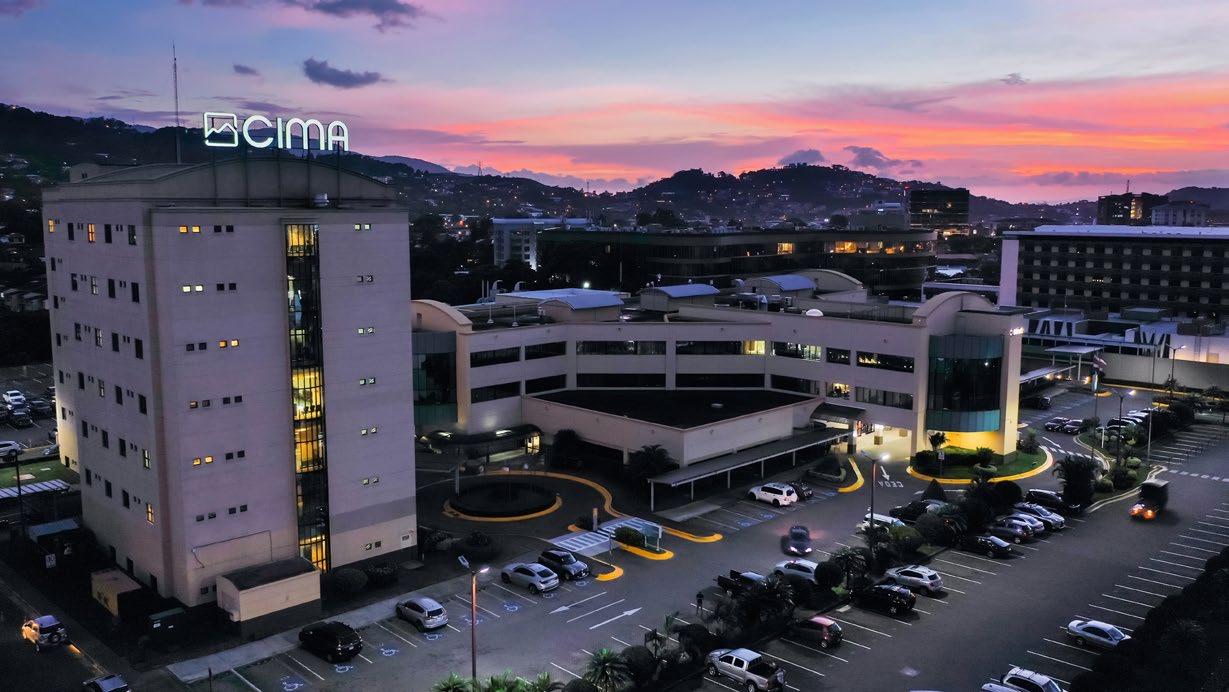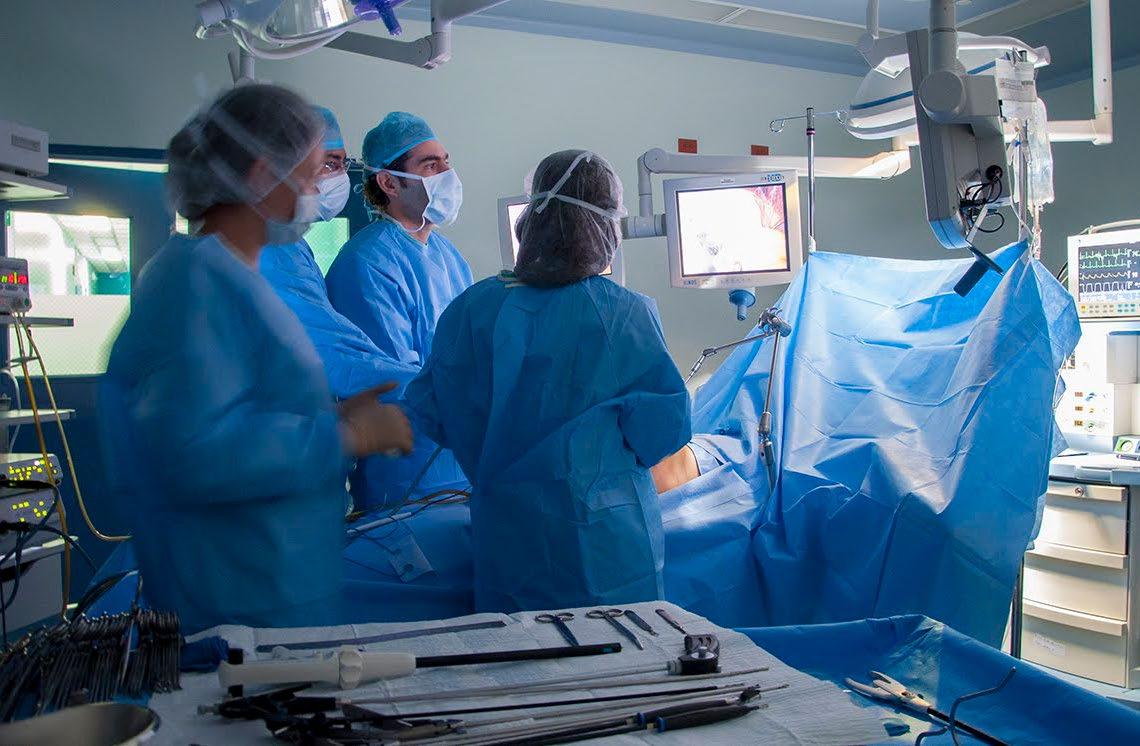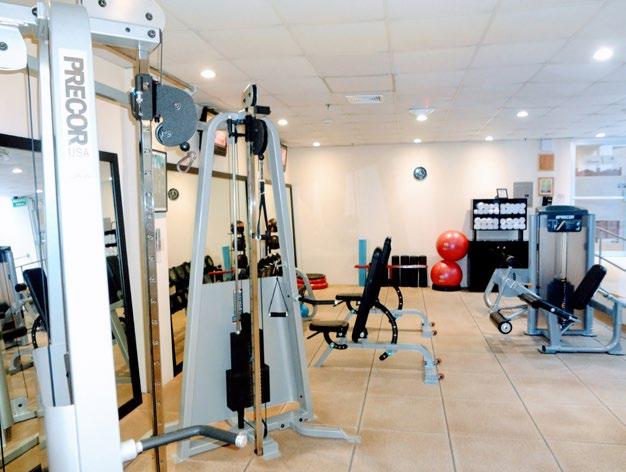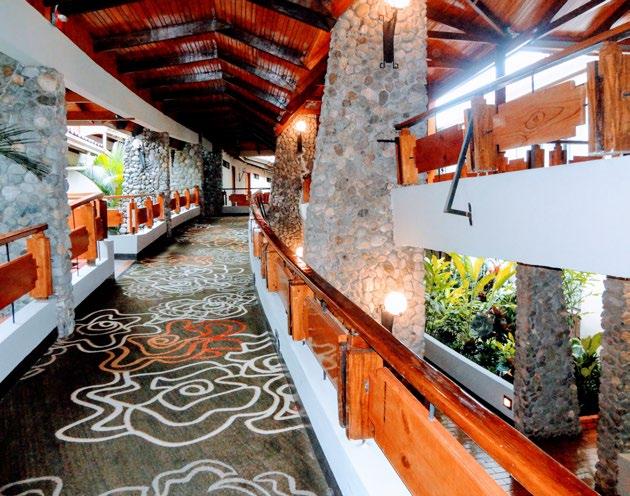
23 minute read
SPOTLIGHT INTERVIEW: RAJESH
from May Self Insurer
by SIPC
SPOTLIGHT INTERVIEW: RAJESH RAO, CEO, INDUSHEALTH; DAVID MAIR, SVP, HOSPITAL CIMA; AND BRAD COOK, PRESIDENT, MEDICAL TOURS COSTA RICA
This interview was conducted by SIIA’s partner in the Connect from Anywhere (CFA) live Medical Travel seminars and was originally released as a special issue of their digital newsletter, prior to the Costa Rica live seminar. A recording of the seminar is available to SIIA members at www.siiacanoe.org.
Advertisement
Medical Travel & Digital Health News (MTDHN): Give the readers an overview of why Costa Rica is a popular medical destination.
Rajesh Rao (RR): Since IndusHealth began offering medical travel programs to selfinsured employers in 2005, we have worked with a variety of top-notch providers in destinations around the globe in the pursuit of providing viable solutions to members of employer-sponsored programs who consider traveling for medical treatment.
Costa Rica provides an ideal combination of affordable healthcare and being relatively easy to travel to. It helps that they have a nice tropical climate yearround and that Costa Ricans have a very hospitable and welcoming culture that makes visitors feel well cared for, and patients even more so.
Costa Rica also provides the right combination of top-notch providers and multi-specialty hospitals with costs that generate sizable savings when applied in service of company-sponsored medical benefits. We require all hospitals in our network to be JCI-accredited so even though we secure lower costs, there is no compromise to the quality of care that our patients receive.
Although several providers claim to provide medical travel solutions, many are geared to cater to the self-pay market with markedly different needs and expectations. Only few providers can make it work for employer-sponsored programs in which participants consistently receive superlative care compared to what they have access to locally. The better the care and recovery experience, the more it gets talked about in a manner that makes it a highly desirable option in the member communities we serve. Brad Cook (BC): I've been working with hospitals in a variety of ways with international insurance billing, so I knew Costa Rica could offer a high-quality level of medical care from really great doctors.
When I would travel to the U.S., I kept hearing people talk about, "Oh, I've been to Costa Rica. I want to go to Costa Rica or my cousin went to Costa Rica with a buddy on a trip." I started thinking there is a lot more we could do here because Costa Rica has emphasized their health system as a priority. They abolished their army in 1948 and have been investing those funds in education and healthcare for many years.
We began to put things together and created a concierge type of service assisting and being an interface between the hospital and the doctors in Costa Rica and people interested in visiting for medical care.
People just feel very, very comfortable in Costa Rica. Like Rajesh said, it's nearby and easy to get to. Costa Ricans have a special way about them that makes people feel welcome and safe, and that is why it is such a popular destination.
David Mair (DM): At its foundation, destination medical care, as I call it, is built on four basic principles for both employer groups and individuals: access, affordability, quality of care, and medical outcomes. Costa Rica and Hospital CIMA, in particular, deliver on those principles.


Doctors and nurses are well-trained and highly skilled on par with their North American counterparts, medical technology is sourced from the same companies used by hospitals in the U.S. (some of it is even manufactured in Costa Rica before being exported elsewhere), and medications come from the same pharmacy companies. For international patients, it’s fast and easy to access care; in fact, we often hear about how much faster it is than at home for people. Costs are transparent and affordable as compared to the U.S.
Hospital CIMA, which celebrates its 21st anniversary this month, has long been highly regarded for its focus on delivering exceptional quality medical care. The latest affirmation of that success is that we earned the JCI’s Gold Seal of Approval ® under the Seventh Edition of the JCI standards. It is the newest standard that's been released. We have been consistently accredited now through five consecutive review cycles.
Many of Hospital CIMA’s physicians have trained internationally. They're multilingual, which creates a terrific environment for patients who are willing to look at care outside of their own communities, caring and take time with each patient. You surround that with a destination where people are caring and thoughtful, and you end up with a phenomenal combination of services, people and technology that really lends itself to exceptional medical care. What’s worth noting here is that we make destination medical care decisions all the time. We just don’t call them that. When we select a doctor, dentist, hospital, etc. that is not the closest one to us, we’ve made a destination medical care decision. We are willing to travel to other cities or states, like travel to MD Anderson for cancer care as one example. The difference here is travel to a high-quality medical center crosses an international border in order to gain financial, access and outcome advantages.
For more than 10 years, I’ve been working with self-funded health insurance on plan designs that integrate destination medical care into the plans. When it’s done properly, and there are few people who know how to truly integrate the benefits into a plan design that hits the
What are clients saying about our EmCap® program?
- CFO, Commercial Construction Company
- Broker

- President, Group Captive Member Company
- President, Group Captive Member Company
- HR Executive, Group Captive Member Company
People are talking about Medical Stop Loss Group Captive solutions from Berkley Accident and
Health. Our innovative EmCap® program can help employers with self-funded employee health plans to enjoy greater transparency, control, and stability.
Let’s discuss how we can help your clients reach their goals.
This example is illustrative only and not indicative of actual past or future results. Stop Loss is underwritten by Berkley Life and Health Insurance Company, a member company of W. R. Berkley Corporation and rated A+ (Superior) by A.M. Best, and involves the formation of a group captive insurance program that involves other employers and requires other legal entities. Berkley and its affiliates do not provide tax, legal, or regulatory advice concerning EmCap. You should seek appropriate tax, legal, regulatory, or other counsel regarding the EmCap program, including, but not limited to, counsel in the areas of ERISA, multiple employer welfare arrangements (MEWAs), taxation, and captives. EmCap is not available to all employers or in all states.
Stop Loss | Group Captives | Managed Care | Specialty Accident
right targets, we are able to integrate financial incentives, reduce overall costs, and take advantage of tax deductibility, in some instances.
It is those plan designs that lend themselves to insurance coverage so that employers can look at a place like Costa Rica and this team and find accessible, affordable high quality of care in a single package.
The team that you're interviewing here has really focused on doing medical travel for corporations, for business health plans in ways that others have really not contemplated or delivered well.
RR: Besides the availability of excellent medical care, another important factor is personal safety.
Costa Rica has a low crime rate and extremely friendly people. Not only do you get served really well, but you feel really safe there when you're walking around. One of the concerns we had early on was how well our typical patients unfamiliar with foreign travel would adjust to being in a country where English is not the primary language. We found that all it takes is for the professionals we work with to be able to converse well in English when working with patients.
BC: Yes, Costa Rica has a large number of expatriates from the U.S., so the hospitals and the healthcare providers are very comfortable assisting English-speaking patients and Americans in particular.
MTDHN: What would you consider your centers of excellence as far as service lines and are there service lines there that are new or unusual that you can't get elsewhere?
DM: Hospital CIMA offers more than 60 medical specialties and subspecialties. We have centers of excellence in cardiovascular care, maternity care, orthopedics, oncology endocrinology and neurosurgery, among many others.
We also include an International Pharmacy Program for our clients to address the high cost of pharmaceuticals in the U.S. and later this year we’ll be adding new arrangements that help monitor patients’ needs from the comfort of their homes.
INNOVATIVE STOP LOSS AND ANCILLARY SOLUTIONS

At BenefitMall, we know that employer groups benefit most from treating their health plan as an investment rather than an expense. Our team of self funded consultants can help you succeed by offering: • Reporting, Compliance Services and Plan Document Review • Billing and Premium Collection • Ancillary Products and Services • Unbiased Expertise and Review • Initial Placement, Implementation and Renewal of Coverage • Claims Audit, Submission, Tracking, and Resolution Services
©2020 BenefitMall. All rights reserved.
www.benefitmall.com 888.248.8952
MTDHN: How do you measure outcomes?
DM: A starting point for us as a key measure of the patient experience is Hospital CIMA's Net Promoter Score. Net Promoter Score is essentially the number of people who tell you that they would recommend the hospital to friends and family minus those who would not.
Hospital CIMA’s Net Promoter Score is currently 94. The average for the American healthcare industry is in the 50’s.
It is something that we're proud of, because it speaks directly to multiple aspects of the overall patient experience, including the quality of their medical care, the physicians and nurses, the staff who support them, and their medical outcomes. One isn’t a Promoter in the NPS system if the quality of their care and outcomes aren’t excellent.
We had one patient who was so pleased with his medical experience that he flew his therapist to Dallas to continue his care. That continued for several years.
I'm sure that Rajesh and Brad can tell you from their experience, it only takes about three people from a company to turn into a regular flow of people coming because they hear about the high-quality care, compassionate care and affordability for both the individual and the employer. MTDHN: Can you talk about affordability? How are costs bundled? Are costs inclusive and are they comparable to bundles that are now being offered in the United States?
RR: We have arrangements where we get bundled prices for all medical services associated with each patient encounter. We then add the cost of travel, meals, accommodations and other qualified travel expenses such as passports. The health plan receives a single allinclusive bill. We make sure that all these costs are in compliance with ERISA and insurance billing standards. We also take care of everything, so the patient doesn't have to pay anything out of pocket.
Although certain domestic providers are starting to offer competitive bundled rates, there are certain differences in the way their packages are structured. One of the key differences is the length of recuperative stay and professional care during that period. In our model, it’s essentially another tier of choice available to patients.
MTDHN: What is the comparison of cost to the United States? What does it cost?
RR: Depending on the type of surgery and the pricing obtained provided to an employer, net cost-savings typically varies between 25 to 50%. For example, Joint Replacements typically generate savings in excess of $25,000, and




certain Lumbar and Cervical Spine Repair procedures can save well over $50,000, in some cases to the tune of $100,000. Bariatric Surgeries yield around $15,000 in savings, whereas various types of Joint Repair, Hernia Repair and Hysterectomies can deliver between $10,000 to $15,000.
If you just look at the medical component, it's probably a smaller fraction but by the time you add on the other overhead costs with travel, you'd actually save about half across the board.
I should note it varies from one market to another as there's a wide variation across the U.S.
MTDHN: Are there any opportunities for a guarantee or warranty, if there is a less than optimal outcome? What happens if something goes wrong?
RR: Medical care invariably presents scenarios where things don’t go exactly as planned. When there are incremental costs, additional charges tend to be a fraction of corresponding costs in the U.S., resulting in further cost savings. Managing such eventualities and accommodating changes to plans is an integral part of our service offering. If something goes wrong, we work closely with patients and providers to ensure that the patient is equipped to pursue an appropriate resolution.
DM: I've heard hospitals around the world who claim to offer a services warranty before, but I’ve seen very few stand behind it in meaningful ways. In part that’s because the issues that arise are often ones of compliance or patient activity after surgery. There’s also the problem of patient’s who have returned home. If the experience doesn’t go well, they are rarely inclined to go back for a second effort.
At Hospital CIMA, our focus for the patients we serve is getting the procedure done properly the first time, and our record shows we succeed in hitting that target.
That said, there are times when something happens during a surgery that requires additional attention or surgical time. Minor cost variations can result, and we disclose that potential to patients ahead of time.
MTDHN: Can you address employers interested in introducing this benefit? Do you suggest they do it during the signup season? Can they do it any time of the year? How do they carve in or carve out payers? Do you have any advice for that?
RR: It depends on the employer. We find that some employers are geared to be able to offer it outside of open enrollment and begin the process anytime, others are not.
Larger employers tend to align it with their plan year and announce it during open enrollment, whereas smaller employers are better equipped to communicate interim plan changes within their smaller. We are able to support them either way.
DM: In the employer groups that we serve directly and others with whom we speak, the fact that medical travel is available as an add-on option or a fully integrated benefit, allows them to look at what they have in their existing plan and add medical travel benefits at any time.
They may not at mid-year have the full robust nature of what they will have later but they're certainly able to add that and begin achieving a cost savings for both patients and the corporation.
RR: Some choose to start with a particular specialty that they perceive as more urgent for their needs, for example, orthopedics before expanding to other specialties.
MTDHN: Can you tell the readers about the kinds of companies that you're currently working with? RR: We have served HSM Solutions, for the past 15 years, as well as companies like Ashley Furniture and CommScope. We encounter a variety of needs and perspectives in the self-insured market depending on the size of the employer, and whether they are public or private companies. We typically work with their benefits consultants to support with claims analysis, plan design, communications and implementation of our medical travel option to their members.
DM: We have direct contracts with employers, and we work with third-party administrators, care navigators, and others. For the most part, the employer groups are self-funded, because they realize the direct savings from these initiatives, but there are situations in which an insured company or individual reach out to us as well. We’ve had some preliminary discussions with stop-loss insurers about integrating services for their clients.
MTDHN: Do you see any opportunity to work with a Medicare Advantage Plan for the United States?
RR: We have talked about it to a couple of players that have tried to implement solutions in that arena, but it has not gone beyond theoretical because they have found some hard limitations when they try to structure it.

Protecting plans and patients across the U.S. 297 97.2% 50
On average, aequum resolves claims within 297 days of placement aequum has generated a savings of 97.2% off disputed charges for self-funded plans aequum has handled claims in all 50 states
1111 Superior Avenue East Suite 2500 Cleveland, OH 44114 P 216-539-9370
www.aequumhealth.com
No Guarantee of Results – Outcomes depend upon many factors and no attorney can guarantee a particular outcome or similar positive result in any particular case.

They do find there are some issues they run into when they begin to propose this where some of them are more political in nature. I think it will happen eventually and there will be plans that begin to offer these.
DM: Medicare Advantage is a very interesting question because it's a public program administered through a private insurer. One of the challenges is getting the insurers to appreciate the fact that something with a Medicare label doesn't have to stop at the border as traditional Medicare does.
Because Medicare Advantage insurers are also private health insurers, they tend to utilize their existing medical networks. That’s a challenge on both sides of the medical travel equation. I’ve spoken with some who understand the advantages but have a hard time determining how to integrate medical travel without disrupting relationships in their existing provider networks. I’m encouraged that some are willing to talk about it.I share Rajesh's feeling that it's going to expand in terms of opportunity, but it may happen slowly. BC: About 10 to 12 years ago, there were two different Medicare Advantage Plans that came to Costa Rica and had us do a lot of work going through different things to see if it was feasible. At one point it looked like they were going to do something but neither one of them actually panned out. But it has been something that has been on the radar.
RR: I think that there are some intrinsic challenges there, anything that has the big insurers kind of diverting traffic is going to create issues for them.
MTDHN: Can you explain the COVID-19 situation in Costa Rica? What are the policies for U.S. citizens traveling? Do
THIS YEAR MARKS COMPANION LIFE INSURANCE COMPANY’S 50TH ANNIVERSARY. WE HAVE A LOT TO CELEBRATE.
Fifty years of securing successes and overcoming challenges. Five decades of developing a strong and stable company. Half a century of building strong partnerships.
We’re not only remembering our past. We’re also looking to the future. Let us help you grow your business in the years to come. We can help give you the products and solutions you need. We’re here for you. STOP LOSS INSURANCE LIMITED BENEFIT HEALTH INSURANCE SHORT TERM LIMITED DURATION INSURANCE GROUP SUPPLEMENTAL EXPENSE INSURANCE MEDICARE SUPPLEMENT INSURANCE LIFE INSURANCE DENTAL INSURANCE SHORT TERM DISABILITY INSURANCE LONG TERM DISABILITY INSURANCE VISION INSURANCE CRITICAL ILLNESS INSURANCE

Rated A+ by AM Best Company. Rating as of Dec. 9, 2020. For the latest rating, access ambest.com. Opinion from the leading provider of insurer ratings of a company’s financial strength and ability to meet its obligations to policyholders.
BC: Costa Rica is doing quite well. The borders were closed from about March to October. There were a few states open in a few countries, but everything opened as of November.
There was a previous requirement for a COVID-19 test, but they do not require it anymore because of the robust protocols in place for tourists.
U.S. citizens will however have to get a test before returning home as per the U.S. protocol.
For medical travelers, before they go to a hospital for surgery, they do have to have a COVID-19 test and must test negative before they can have surgery. We're averaging less than about 200 cases per day. Numbers are lowering as vaccines roll out. It'll take a while to get the whole country but every week more and more populations are being vaccinated.
DM: Costa Rica now requires for entry that visitors purchase an insurance policy that covers medical care for COVID-19 as well as accommodations should they need to be quarantined. I think this is a really positive move by the government to make sure that everyone is well protected and the people are able to isolate effectively.
The government seems to have done a very good job of managing social distancing and other kinds of protective measures. They have been very successful to the point that the country was able to fully open its air borders, as Brad said, in early November to international travelers.
MTDHN: What happens if a traveler tests positive before returning to the United States? Do they quarantine in Costa Rica for two weeks?
DM: Yes. Airline passengers traveling into the United States are required to have a negative COVID-19 test, either PCR or antigen, within three days of their flight back.
Utilization
Quality Cost

Bring balance to your health plan
Improve Quality, Manage Utilization, Reduce Cost
The long-term financial security of your medical benefit plan depends on managing much more than the cost of care. Through our ever-expanding analytic and predictive capabilities, Vālenz® enables you to make decisions that secure savings while empowering members to lead strong, vigorous and healthy lives.
Visit valenzhealth.com or call (866) 762-4455 to bring balance to your medical benefit plan.
Proud to be a Diamond Member

Other nations have similar requirements. In the unlikely event someone tests positive, they are required to comply with the Costa Rican quarantine requirement.
At the hospital, we've been able to continue to serve patients who are in the country from around the world. Unlike what U.S. hospitals experienced during the pandemic, at Hospital CIMA, we were able to continue to provide our full range of medical services without interruption.
As Brad mentioned, any surgical candidate will receive a COVID-19 test as part of the treatment package. If someone tests positive for Covid, there is a required quarantine, and then and then we can do the procedure at the end of that period.
For emergencies, we instituted a set of COVID-19 related protocols so that our staff knows they're working with a patient who's tested positive and are taking additional safety measures to protect both the patient, doctors and nurses in operating room and others in the hospital. Outside the operating room, we have had a dedicated unit for COVID-19 patients both in the medical-surgical rooms in the hospital as well as our ICU in order to care for them and minimize the spread of the disease. RR: Absolutely. We have witnessed a pent-up demand due to the reduction of international travel during the first several months of the pandemic. Several patients waited patiently for the borders to open. It created a good test case for us to see how well the carefully established COVID-19 safety protocols were working. Thankfully, we haven’t had a single of a medical traveler being quarantined or testing positive.
Medical costs are likely to continue to rise disproportionately in the U.S. as compared to the rest of the world. Trends suggest that medical travel will continue to grow as a desirable solution especially for those who cannot obtain affordable, high quality care in their local markets.



Many people were not able to receive surgeries they planned for due to U.S. hospitals having to suspend certain kinds of medical procedures in 2020. Most of those medical needs didn't go away; the patients just had to wait. I do think, though, that it may rebound slowly as people become comfortable with international travel again. We are, however, seeing the early stages of that.
From a self-funded employer plan perspective, what you would have perhaps seen as savings on the surgical care side were unfortunately replaced by COVID-19 care expenses. Those two things continue into 2021 and are going to create an additional financial push for self-funded employers.
Destination-based care especially coordinated the way IndusHealth, Medical Tours and CIMA put it together, gives employers an immediate opportunity to relieve that demand and get relief from the increased costs they may face, the impacts on stop loss insurance and other things, in ways that are meaningful without having to sacrifice quality of care. That in many ways is the real story of the benefit of medical travel to through this team.
RR: Basically, medical travel is an experience driven business in the sense that if patients and plan sponsors don't have a good experience, there's no business to be had.
Patients returning home and talking about their experience is the key to generating interest in their communities and amongst their coworkers. Costa Rica has certainly done a great job of creating an environment where people will talk about it a lot. When people first hear about Costa Rica, most don't know where exactly it is but once they experience the program, they all want to go there, because they get such good care.
BC: Our jobs are to make sure that the whole process of traveling to Costa Rica for care is seamless. We take care of every detail for the patients. We assist them through the whole process of getting to the hospital and coordinating with doctors.
If you picture yourself as a patient in the U.S., generally after surgery, a day or two later, you're back home. You're dealing with your spouse, the kids, who's going to feed the dog and what you are going to eat.
Basically, that's why the experience is so different here, in this beautiful country. You are recovering, being visited by a nurse every day, doctors review your progress daily and you have physical therapy.
There's a lot of things that go beyond what you would normally expect that really surprise the patients.
We get patients that have come back after a surgery if they need something else done because they recognize how different this process is here.









